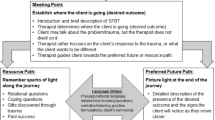Abstract
This study is an exploratory, qualitative investigation of breast cancer survivors’ experiences of paradox, following psycho-spiritual integrative therapy (PSIT). Previous studies examined the role of paradox in spiritual development among women diagnosed with cancer; this study investigated a psycho-spiritual intervention for multicultural cancer survivors. Twelve multicultural breast cancer survivors, from a sample of 30 women participants in an 8-week PSIT group intervention, were recruited from oncologists, hospitals, support groups, outpatient oncology centers, surgeons, radiation therapy centers, cancer events, and websites. We conducted semi-structured, open-ended interviews lasting 1–2 h regarding participants’ experiences coping with cancer and their experience of PSIT. We transcribed interviews and conducted blind searches for both new and previously identified paradoxes and themes. Two previously identified themes emerged: (1) attempting to maintain coherence in new and old ways and (2) letting go of ultimate control in life. Additionally, three novel themes emerged: (1) interconnection between helpers and hinderers, (2) spiritual edges and tensions, and (3) new paths to empowerment. Results of this qualitative analysis indicate participants experienced previously identified themes and experienced an expanded range of paradoxes. After learning compassionate acceptance through PSIT, breast cancer survivors develop greater access to the multidimensionality of paradoxes, which can go beyond a binary (either/or) construction to a more interdependent (both/and) relationship. Devoting greater attention to investigating and understanding how diverse participants engage with and move through paradoxical change processes could enhance the effectiveness of existential and spiritual interventions.
Similar content being viewed by others
References
Ano, G. G., & Vasconcelles, E. B. (2005). Religious coping and psychological adjustment to stress: A meta-analysis. Journal of Clinical Psychology, 61(4), 461–480. doi:10.1002/jclp.20049.
Bowman, K. F., Deimling, G. T., Smerglia, V., Sage, P., & Kahana, B. (2003). Appraisal of the cancer experience by older long-term survivors. Psychooncology, 12(3), 226–238. doi:10.1002/pon.630.
Boyatzis, R. E. (1998). Transforming qualitative information: Thematic analysis and code development. Thousand Oaks: Sage.
Braun, V., & Clarke, V. (2006). Using thematic analysis in psychology. Qualitative Research in Psychology, 3(2), 77–101.
Cohen, S., Mount, B., Tomas, J., & Mount, L. (1996). Existential well-being is an important determinant of quality of life. Cancer, 77(3), 576–586.
Corwin, D., Wall, K., & Koopman, C. (2012). Psycho-Spiritual Integrative Therapy: Psychological intervention for women with breast cancer. The Journal for Specialists in Group Work, 37(3), 252–273.
Garlick, M., Wall, K., Corwin, D., & Koopman, C. (2011). Psycho-Spiritual Integrative Therapy for women with primary breast cancer. Journal of Clinical Psychology in Medical Settings, 18(1), 78–90. doi:10.1007/s10880-011-9224-9.
Gotay, C. C. (1996). Cultural variation in family adjustment to cancer. In L. Baider, C. L. Cooper, & A. Kalpan De-Nour (Eds.), Cancer and the Family (pp. 31–52). West Sussex: Wiley.
Halstead, M. T., & Hull, M. (2001). Struggling with paradoxes: The process of spiritual development in women with cancer. Oncology Nursing Forum, 28(10), 1534–1544.
Kurtz, M. E., Wyatt, G., & Kurtz, J. C. (1995). Psychological and sexual well-being, philosophical/spiritual views, and health habits of long-term cancer survivors. Health Care for Women International, 16(3), 253–262. doi:10.1080/07399339509516176.
Mast, M. E. (1995). Adult uncertainty in illness: A critical review of research. Scholarly Inquiry for Nursing Practice, 9(1), 3–24. discussion 25–29.
Mertons, D. M. (2005). Research and evaluation in education and psychology: Integrating diversity with quantitative, qualitative, and mixed methods. Thousand Oak: Sage.
Pargament, K. I., Desai, K. M., & McConnell, K. M. (2006). Spirituality: A pathway to posttraumatic growth or decline? In L. G. Calhoun & R. G. Tedeschi (Eds.), Handbook of posttraumatic growth (pp. 131–137). Mahwah: Lawrence Erlbaum.
Pargament, K. I., Ensing, D. S., Falgout, K., Olsen, H., Reilly, B., Van Haitsma, K., et al. (1990). Religious coping efforts as predictors of the outcomes to significant life events. American Journal of Community Psychology, 18(6), 793–824.
Pargament, K. I., Murray-Swank, N., Magyar, G., & Ano, G. (2005). Spiritual struggle: A phenomenon of interest to psychology and religion. In W. R. Miller & H. Delaney (Eds.), Judeo-Christian perspectives on psychology: Human nature, motivation, and change (pp. 245–268). Washington D.C.: APA Press.
Patton, M. Q. (2002). Qualitative research and evaluation methods. Thousand Oaks: Sage.
Rosenbaum, M. E., & Roos, G. M. (2002). Women’s experiences of breast cancer. In A. S. Kasper & S. J. Ferguson (Eds.), Breast cancer: Society shapes an epidemic (pp. 153–181). New York: Palgrave.
Schneider, K. J. (2008). Theory of the existential-integrative (EI) approach. In K. J. Schneider (Ed.), Existential-integrative psychotherapy: Guideposts to the core of practice (pp. 5–48). New York: Routledge.
Soeken, K. L., & Carson, V. J. (1987). Responding to the spiritual needs of the chronically ill. Nursing Clinics of North America, 22(3), 603–611.
Wall, K., Corwin, C., & Koopman, C. (2012). Reaping fruits of spirituality through Psycho-Spiritual Integrative Therapy in cancer recovery. In T. G. Plante (Ed.), Religion and positive psychology: Understanding the psychological fruits of faith (pp. 233–246). Santa Barbara: Praeger.
Williams, P. (1993). A personal account of breast cancer. Toronto: Dundurn Press.
Acknowledgments
The authors express gratitude to Nicole Shechtman, Ph.D., and Valerie Cheasty, J.D., for their contributions. The Lloyd Symington Foundation provided financial support for this research.
Conflict of interest
None declared.
Author information
Authors and Affiliations
Corresponding author
Rights and permissions
About this article
Cite this article
Patel, K., Wall, K., Bott, N.T. et al. A Qualitative Investigation of the Effects of Psycho-Spiritual Integrative Therapy on Breast Cancer Survivors’ Experience of Paradox. J Relig Health 54, 253–263 (2015). https://doi.org/10.1007/s10943-014-9827-1
Published:
Issue Date:
DOI: https://doi.org/10.1007/s10943-014-9827-1




